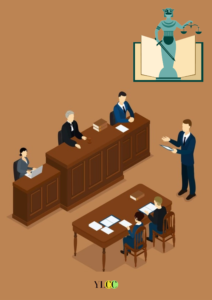
A moot court competition simulates a court hearing (usually an appeal against a final decision), in which participants analyse a problem, research the relevant law, prepare written submissions, and present oral argument. Moot problems are typically set in areas of law that are unsettled or that have been subject to recent developments. They usually involve two grounds of appeal, argued by each side. The procedure imitates that followed in real courts: the judge enters, the mooters and the judge bow to each other, the clerk announces the matter, the mooters give their appearances and are then called on in turn to present their submissions, the judge asks questions of the mooters, the court adjourns, and the judge then returns to deliver a brief judgment and some feedback.
Moot court competitions are widely prevalent in Indian law schools and are considered to be an important element of the co-curricular framework. In fact, several Indian universities over the years have fared exceedingly well in prestigious international competitions. In this article, we highlight 5 leading domestic mooting events in the country. Read on!
1. Surana & Surana National Corporate Law Moot Court Competition
Established in 2002, the competition aims to providing Indian law students an opportunity to develop expertise in the area of corporate laws like Companies Act, Taxation (domestic and international), Contracts, Foreign Exchange and Investments, Securities Regulations and Corporate Governance. The highlight of the competition is that it is also open to students of the Institute of Chartered Accountants of India (ICAI) and Institute of Company secretaries of India (ICSI).
2. Bar Council of India International Law Moot Court Competition
The Bar Council of India Trust organises All India Inter-University Moot Court Competitions for law students to promote the advocacy skills and love for the profession among the new entrants. In fact, the body has been organising its national level Moot Court Competitions about 26 years. The Bar Council of India has decided that the Bar Council of India Trust would conduct the 1st BCI International Moot Court Competition in association with KIIT Law School, Bhubaneswar in the month of February, 2011. Since then, the competition has grown from strength to strength and is now one of the foremost competitions in the country.
3. NUJS Herbert Smith National Corporate Law Moot Court Competition
Every year, as a part of its Indian University Support Initiative, Herbert Smith Freehills LLP in association with the WB National University of Judicial Sciences (NUJS) organizes the NUJS-HSF National Corporate Law Moot Court Competition (NUJS HSF Moot).The moot problem is usually based on contemporary issues in corporate and commercial law in India and witnesses participation from contingents of over twenty Indian law universities.

4. KK Luthra Memorial Virtual Moot Court Competition
The K. K. Luthra Memorial Moot Court is held at the Campus Law Centre, Faculty of Law, University of Delhi (India) at the 3rd weekend of January every year. This Competition is the only exclusive International Criminal Law Moot Court held in India. Since 2005, the Competition has been held annually at the Campus Law Centre premises in the memory of Late Sh. K. K. Luthra, Senior Advocate, an eminent criminal lawyer, whose legal career spanned from 1949 till his demise in 1997. The Competition was instituted and organized by Mrs Nirmal Luthra and after her demise in January 2020, her family is continuing with the Competition. In 2021, the competition was conducted in a virtual mode due to the ongoing pandemic.
5. National Law School Trilegal International Arbitration Moot (NLSTIAM)
NLS-Trilegal International Arbitration Moot is the flagship event of the Moot Court Society, National Law School of India University, Bangalore. It is India’s only arbitration moot. It provides students from across the globe with a unique opportunity to gain a working understanding of arbitration through a simulated version of arbitral proceedings. The moot deals with cutting-edge issues in contemporary arbitration law. In previous editions of NLSTIAM, participants have had the opportunity to explore issues including as the recovery of costs, damages for loss and reputation, unjust enrichment and jurisdiction of the tribunal, arbitrator bias and confidentiality.
There are several other competitions too, which we shall cover in our subsequent publications. Stay tuned to the YLCC website!
YLCC would like to thank Sachet Labroo for his valuable inputs in this article.






